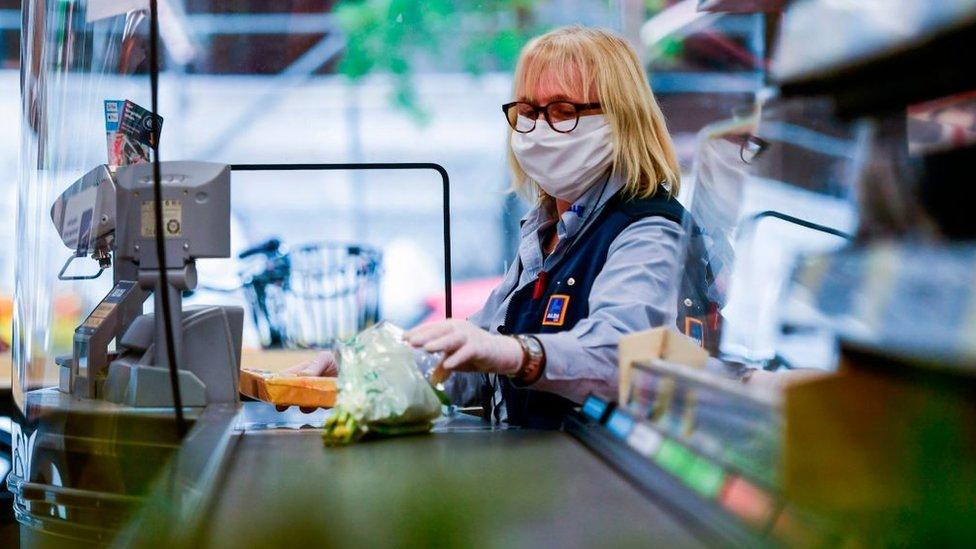Covid in Wales: Supermarket rules 'will not be reversed'
- Published
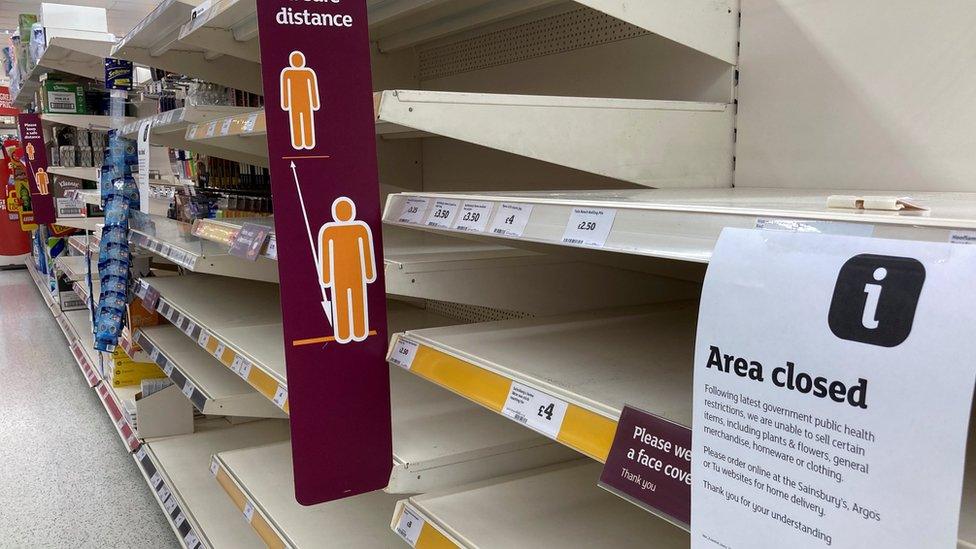
The ban has provoked a fierce debate on what goods are "essential"
Rules banning shops selling non-essential items during Wales' firebreak lockdown will not be reversed, First Minister Mark Drakeford has said.
On Sunday afternoon, Mr Drakeford said the implementation of the rules may be tweaked, but the "basic decision" behind the ban was the right one.
A petition, external on the issue has exceeded 60,000 signatures, making it the largest ever submitted to the Senedd.
The Welsh Conservatives earlier said the rules were "mixed-messaging".
Supermarkets have been told they can only sell "essential" items and must close parts of their stores which sell products such as clothes, shoes, toys and bedding during Wales' 17-day "firebreak" lockdown.

Mark Drakeford has said he will review the lockdown restrictions on what supermarkets can sell, but the ban will not be reversed
In an interview with BBC Wales, Mr Drakeford said: "The position we face in Wales is really and deeply serious and for these two weeks we are asking people to stay at home and not to mix with other people as much as they can.
"If the rules are not sensible rules, if there are anomalies that are emerging, we will put them right, but the basic underlying public health emergency has not gone away.
"The basic decision is the right one. If the implementation of it, the interpretation of it needs to be revisited to make sure the rules are sensible, then we will do that.
"Non-essential goods are not allowed to be sold over the next two weeks. That's why there are hundreds of shops the length and breadth of Wales are closed. The underlying issue is not about shopping, it is about saving lives."
Mr Drakeford said a review into how the rules have been implemented would be held on Monday.
Marr: Wales' health minister Vaughan Gething explains Wales supermarket rules
Is there discretion in the rules?
Following comments earlier on Sunday by Welsh Government ministers Lee Waters and Jeremy Miles, Mr Drakeford said there is some "discretion" in the rules for shops to sell "non-essential" items in certain circumstances.
"I was told over the weekend of a child arriving with a foster carer with nothing at all. In those circumstances there is discretion for that very unusual set of circumstances to be addressed.
"If we need to make that clearer, if we need to talk to supermarkets about how that can be addressed, that's what we'll be doing tomorrow."
Welsh Government guidance, external states if there is doubt as to whether an item is a necessity, shops will be "expected to use their best endeavours to consider what is available".
The head of the Welsh Retail Consortium, Sara Jones, said: "To hear that discretion can be applied, of course that's good because it's showing that ministers are listening and that they're willing to look at ways to move forward.
"However, it does open a whole host of other issues. For example, by actually allowing that discretion to happen it means that actually the consumer is going to spend more time in store having to seek advice having to seek guidance.
"That's going to have the opposite effect of what the policy was intended for in the first place, which was to minimise the amount of time people should spend in store."
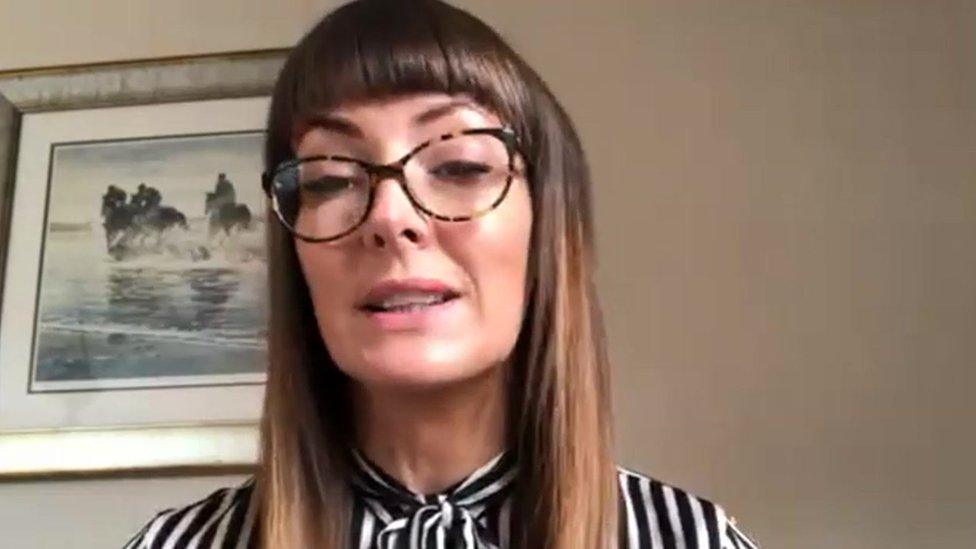
Sara Jones called for the rules to be reversed
How do shoppers feel?
One woman, whose daughter was admitted to hospital on Saturday, said she was unable to buy new clothes for her despite her pyjamas being "soaked in blood".
Chelsea Jones, from Llwynypia, Rhondda Cynon Taf, said she was forced to make a 40-mile trip home to collect replacements.
"I was driving around crying in a panic trying to find somewhere that I am able to pick up some essentials for my child," she said.
"I have never felt so angry, frustrated or upset, ever. You just never know when a 'non essential item' will become 'essential' to you."
Another parent, Jodi Merry, who is also from Rhondda Cynon Taf, said the rules were an "inconvenience" and she was planning to buy clothes for her eight-year-old son after she gets paid next week.
"I know it's only two weeks but he doesn't have any winter pyjamas...Clothing, shoes and even bedding are definitely essentials."
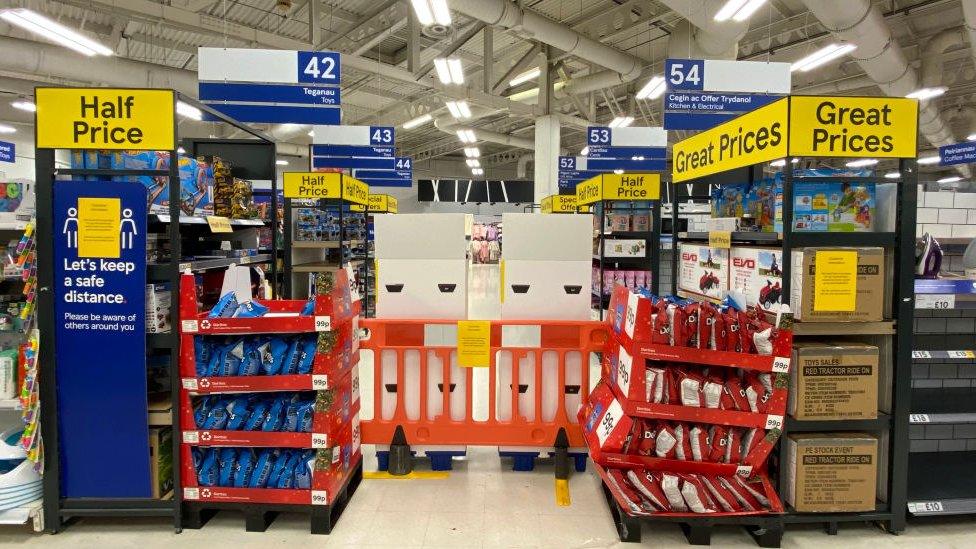
The toy aisle at Tesco on Western Avenue in Cardiff has been blocked off - the sales ban also applies to clothing
Shoppers in Cardiff had mixed opinions on the new rules.
Jane Millersmith said: "I think it's absolutely, totally ridiculous. The idea that somebody who's on benefits and is waiting for their money to come through, maybe until next Thursday or Wednesday, can't then buy a child a pair of school shoes is outrageous."
Meanwhile, Rebecca Edwards said: "If I was desperate because I'd broken my kettle I'd think 'I'll go and buy a kettle quickly' I'm not going to browse the whole of the homeware department because I need a kettle, I'd just go and buy a kettle because that's what I'd come for."
However, Oliver Bowler said he thought the Welsh Government was taking a "proportionate approach".

SOCIAL DISTANCING: Can I give my friends a hug?
PAY-PACKET SUPPORT: What will I be paid under the new scheme?
SUPPORT BUBBLES: What are they and who can be in yours?
FACE MASKS: When do I need to wear one?

Wales' firebreak lockdown is in place until 9 November.
The Welsh Government added it had made a further £300m available to support businesses affected.
'Absolute madness'
Secretary of State for Wales Simon Hart urged, external Mr Drakeford to "scrap the policy" while Welsh Conservative leader Paul Davies called for the Senedd/Welsh Parliament to be recalled "virtually" to debate the matter.
"This is absolute madness by the Welsh Government, preventing people from buying the products which they want to buy," he said.

How are the restrictions affecting you? Share your experiences by emailing haveyoursay@bbc.co.uk, external.
Please include a contact number if you are willing to speak to a BBC journalist. You can also get in touch in the following ways:
WhatsApp: +44 7756 165803
Tweet: @BBC_HaveYourSay, external
Please read our terms & conditions and privacy policy
If you are reading this page and can't see the form you will need to visit the mobile version of the BBC website to submit your question or comment or you can email us at HaveYourSay@bbc.co.uk, external. Please include your name, age and location with any submission.

IN LOCKDOWN THIS WEEKEND?: Here are the best new TV and streaming shows, reviewed for you
IMMERSE YOURSELF: 90 minutes of sublime music to get lost in today

- Published23 October 2020
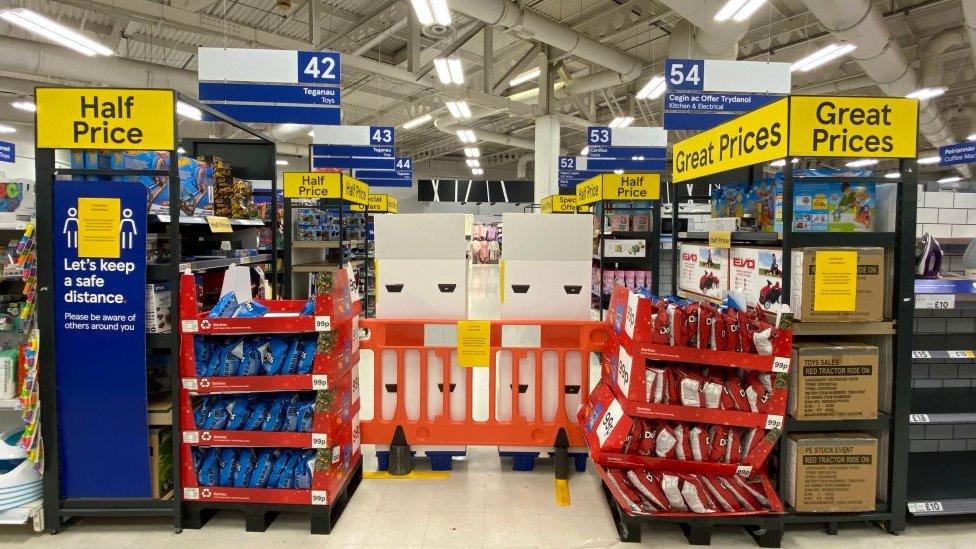
- Published22 October 2020
